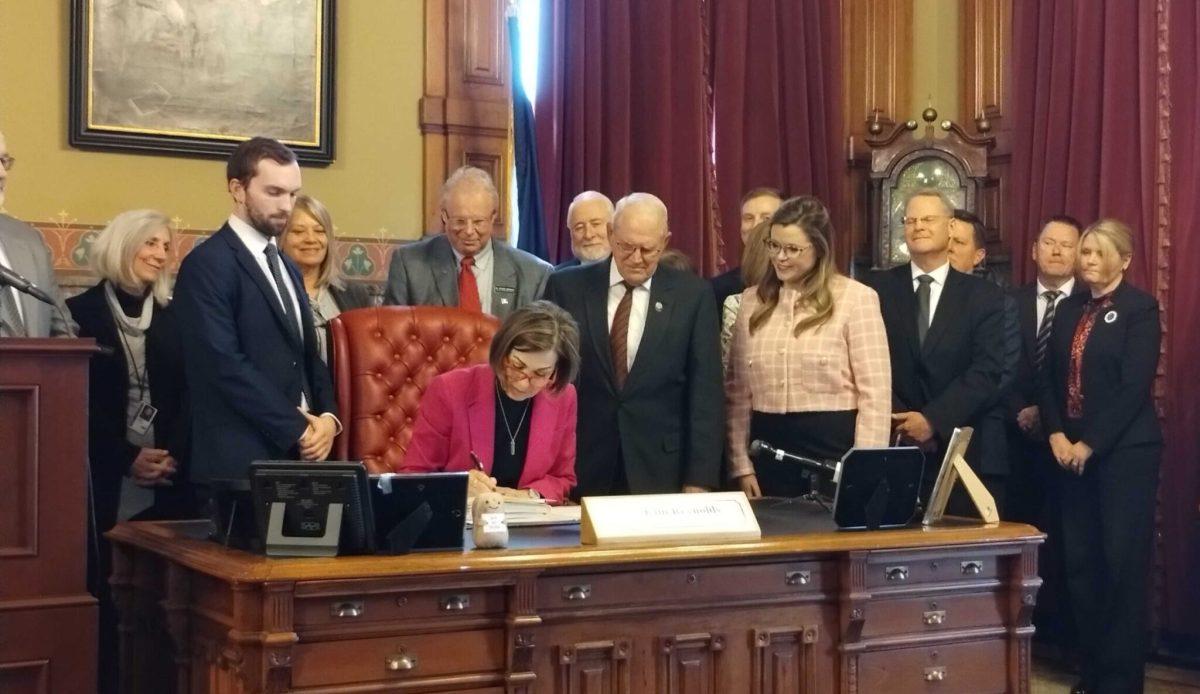Classrooms have become a subject of increasing political controversy across the nation. This session, Iowa legislators proposed bills to fund programs to arm teachers and divert funding from the state’s Area Education Agencies (AEAs) — among many others.
Drake School of Education students encounter the effects of these bills as student teachers, and they will continue to navigate these effects as full-time teachers and administrators.
“From my brief time as a student teacher, I have already heard current full-time teachers discussing these bills with similar attitudes as me and my classmates,” Jaguer Heier, a senior majoring in secondary education, said over text message. “Teachers are an incredibly well informed group of people, and they are the first to chime in with their ideas and oppositions toward any changes or revisions made in the system that would largely affect their workplace and students.”
School of Education Dean Ryan Wise said the school strives to prepare students for the political implications of teaching. Professors in the school often host panels of current educators and employees of professional education associations to talk about their experiences with different education laws. Even though legislation passed in recent years — such as restrictions on K-6 content discussing “gender identity” and “sexual orientation” — have made teachers’ jobs more difficult, according to Wise, the school doesn’t struggle to retain students.
“[A student] saying, ‘Actually, I’m not going to go down this career path at all,’ doesn’t happen all that frequently,” Wise said.
It “feels like” education is becoming a greater focus of the Iowa Legislature, senior Richard Lock said, although it’s difficult to compare the volume of education legislation over the years. Wise said that, although education seems to garner more attention with each Iowa legislative session, it’s the profile and controversiality — not the volume — of these bills that has increased.
There is, however, an upside to high-profile education bills, Wise said: More Iowans are “engaging in issues related to education.”
This session, the AEA bill garnered a reputation. Signed into law last week, the bill diverts 10% of Iowa’s AEA special education funds to school districts and increases state per-pupil spending by 2.5%. Republicans widely lauded the bill as allowing school districts to adapt services to their students’ needs, while Democrats claimed the bill was rushed through the legislature and out of touch for Iowans. Five days before the Senate passed the bill on to Iowa Gov. Kim Reynolds, House Republicans added a piece to the bill that increases the minimum salary for a beginning teacher from $33,500 to $50,000.
“I really wish they didn’t put those two together,” Lock said.
Heier added that “it’s nice to see the starting salary raised” but called the diversion of AEA funds a “big red flag.”
Another high-profile education bill would require all Iowa school districts with more than 8,000 students to employ at least one security or school resource officer — and encourage districts with fewer than 8,000 students and private schools to do the same. Iowa code allows schools to arm staff — last fall, two Northwest Iowa school districts tried to arm a portion of their staff but rescinded the effort after insurance companies refused coverage. This bill would require insurance companies to cover programs to arm school staff, thus removing existing barriers.
“I have not met or talked to any colleagues that believe they should be armed to make schools safe,” Heier said. “It is not why any of us decide to join a career in education.”
Lock said he doesn’t know any teachers who want to carry a firearm on school premises and doesn’t think the bill will have particularly negative or positive consequences.
Both students said Iowa’s political climate factors into whether they’ll choose to stay here and teach. Teaching licenses are state-specific, but most states participate in pacts that recognize some out-of-state teaching licenses. So, if Lock or Heier decide to teach outside Iowa, they might need to take additional teaching courses to become licensed in a given state.
“I don’t want to abandon the students here as they deserve just as good of an education as those in states with much friendlier laws/attitudes towards public education,” Heier said. “I hope I am able to remain here, but it’s not a decision that I can see long-term as the current [political] climate is.”
Lock cited Senate File 482 — which bans students, staff members and others from entering a school restroom or changing room that does not align with their sex at birth — as an example of a bill that makes teachers’ jobs more stressful. Teachers may stress, for instance, about losing their license — a penalty threatened in the aforementioned restriction on LGBTQ+ materials and a few other recently-passed pieces of legislation.
“It’s not my decision to make, and it’s forced onto me,” Lock said. “I know I could lose my job even if I have the students’ best interests at heart. They are meant to trust me, and I feel as though the law is making me break it.”
Lock is exploring positions in the Des Moines area to stay close to home and maintain relationships he’s built here. As a current student teacher and soon-to-be full-time teacher, he said he wished Iowa legislators would incorporate educators’ perspectives.
“If they got the opinion of 100 teachers of varying genders, races and different areas of Iowa, they would get a much better idea of what we need,” Lock said.








